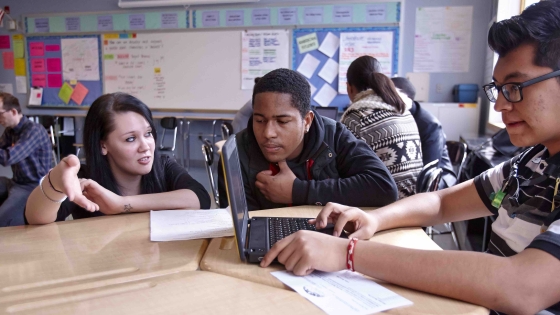2024 marked another exciting and impactful year at the Research Alliance. We worked to advance equity and excellence in New York City schools by providing rigorous, nonpartisan evidence about the policies and practices that promote students’ success. We were proud to launch new projects addressing critical issues, including systemic factors contributing to school pushout and the unique needs of doubled-up students. Meanwhile, our ongoing studies yielded valuable insights about Career and Technical Education, inclusive discipline, college and career advising, and efforts to dramatically expand Computer Science education.
This year, we also deepened our engagement with stakeholders through numerous formal and informal discussions, presentations, public events, and media. We sought to understand and amplify the voices of students, teachers, parents, and community members, which made our research more responsive to the day-to-day needs and realities of NYC schools. Below, we share highlights from our work throughout the year. We extend our heartfelt thanks to our many partners and funders for their invaluable contributions and support. Wishing you a joyous holiday season, and a healthy, happy new year!
Producing Information that Stakeholders Can Use
In 2024, the Research Alliance published research reports, summaries, and Spotlight posts offering actionable insights for a range of education stakeholders. These included:
- Career and Technical Education in Comprehensive High Schools: Lessons from New York City - The second in a series on Career and Technical Education, this report focused on 51 Comprehensive high schools that offer CTE alongside other educational options. This study has informed the design and rollout of new career-connected learning initiatives across the City.
- High School Advising: Exploring NYC Students’ Perceptions of School-Based Support for College and Career Transitions – Using Senior Exit Survey data, this report examined students’ experiences with college and career advising, in both CTE and non-CTE settings. The findings highlighted specific types of college and career support that were associated with better student outcomes, including on-time graduation and college enrollment.
- Do “Bridging the Gap” Social Workers Improve Attendance for Students Experiencing Homelessness? – This analysis found that, after several years, schools with Bridging the Gap social workers saw a 2.4 percent increase in attendance for students living in a shelter, equivalent to four additional days of school annually. This information proved timely, as City leaders considered (and ultimately rejected) funding cuts that would have affected the Bridging the Gap program.
- Participation and Outcomes in Out-of-School Work-Based Learning: Evidence from ExpandED’s STEM Options Program – STEM Options successfully implemented its key components, but just one in three students completed the program. Ultimately, outcomes for participants and nonparticipants were similar. Building on evidence from the study, ExpandED piloted two new program models in 2024.
- What Are the Characteristics of Predominantly Black “Inclusive Discipline” Schools in New York City? - While many studies have examined suspension rate disparities, there has been much less focus on the ways in which individual schools may be disrupting racial inequality in discipline. This analysis illuminated the characteristics of schools with relatively equitable discipline outcomes. Among the key findings: the importance of teacher and administrator experience.
- Expanding Computer Science Education for All: Successes, Challenges, and Implications of NYC's CS4All Initiative - Launched in 2015, CS4All significantly expanded access to computer science (CS) education, tripling the number of schools offering CS in New York City. Over eight years, the Research Alliance studied the initiative’s implementation, providing insights that school and district leaders used to build capacity, expand participation, and advance equity in CS education. This new report makes a number of recommendations for continued improvement.
Supporting the Work of Affiliated Scholars
This year, the Research Alliance expanded our network of Affiliates, and intensified our efforts to connect these scholars with relevant decision-makers in New York City. Affiliated studies have addressed a variety of important topics, including:
- Policies aimed at reducing suspensions and spreading restorative justice practices;
- The experiences and outcomes of NYC’s English learners;
- NYC’s high school admissions process;
- The implementation of anti-racism programs in schools;
- Tools to measure computational thinking in elementary students; and
- Teacher and student perceptions of school climate and discipline.
Informing Public Dialogue
Research Alliance staff and affiliates engaged with stakeholders and shared findings from their work:
- In the press;
- Via academic conferences like SREE, APPAM, and AERA;
- By writing an essay for the Urban Institute’s Learning Curve;
- Through our Executive Director’s Note series;
- By contributing to compilations of research on broadening participation in computer science and Career and Technical Education; and
- Through numerous small-group briefings and meetings — thank you to the many students, teachers, parents, community partners, and school and district leaders who participated in these meetings, provided input on our work, and made use of evidence from our studies!!
Developing New Lines of Research
- Disrupting School Pushout – Supported by NYU’s Discovery Research Fund, this project is investigating systemic and structural factors driving student disengagement.
- Understanding the Unique Needs of Doubled-Up Students in NYC – In collaboration with NYCPS, this study focuses on the challenges faced by students living in doubled-up housing situations, aiming to address gaps in school staff knowledge and resources.
- NYC Partnership for Math Equity – This project examines how supplemental digital math lessons can improve engagement, collaboration, and achievement for Black, Latinx, and low-income middle-grade students.
As we look ahead to 2025, we remain committed to supporting NYC schools with high-quality research that makes a meaningful difference for students and communities. Thank you for being part of our journey!
With warm wishes,
The Research Alliance for New York City Schools

